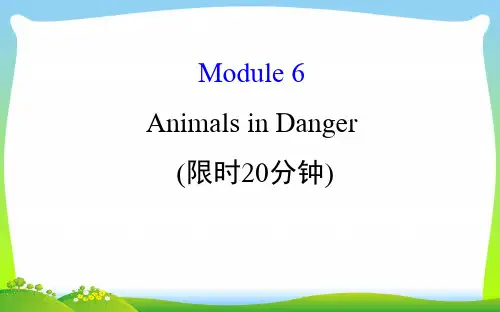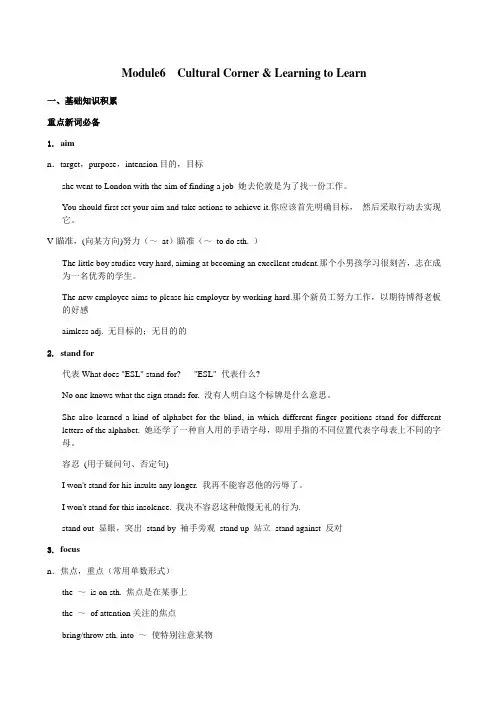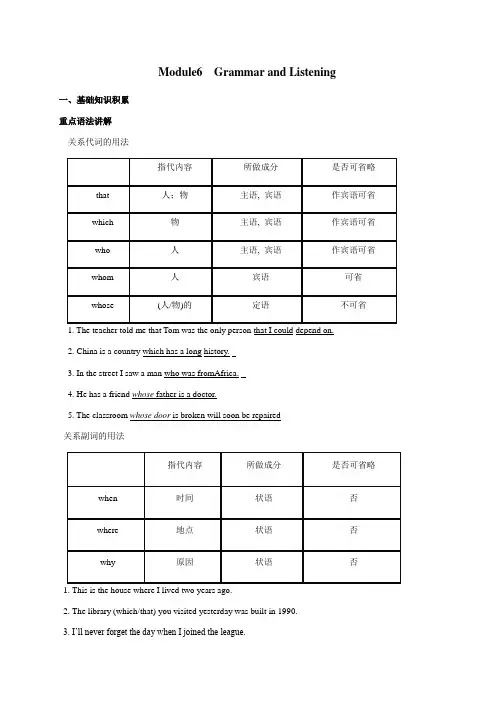外研社必修五module1-6_复习学案
- 格式:doc
- 大小:97.00 KB
- 文档页数:11

外研版英语必修 5 Module 1 reading 导学案无答案Module5 A Life in Sport Reading导学案Learning aims(学习目标):1. To learn some new words and phrases. 学习新词汇及短语。
2. To master the main idea of paragraph3.Key points &Difficulties (重点、难点) :1. To learn some new words and phrases.2. Read the third paragraph fluentlyKnowledge links(知识链接):Step1:Words and phrases:单词和短语1.退休(v)_______________2.退休(n)______________3.表现__________________4.背景____________________5.商标;牌子______________6.运动服装_______________7.标识;标志_________________8.优势;长处_____________9.保证____________________10.购买_________________ 11.设计师__________________ 12.体操运动员___________ 13.标语__________________在课文中找到下列短语并标注在课文中。
1.体操王子the prince of gymnasts2.七个中的六个six out of seven3.以及;和as well as4.制作清单make a list5. 即使;尽管 even if\though6.失败感 the sense of failure7.下定决心做某事be determined to do 8.运动背景sporting background9.与…相比 compare …with 10.由….组成be made up of11.上市come into the market 12.….的数量the number of13.增长on the increase 14.达到 up to15.每十秒every ten seconds 16.have an advantage over …..有优势、在…方面比较有利17.挣钱make money 18.实现理想achieve one’s ambition 19.the chance are(that) ….很可能……Step2:Reading:Fast –reading: Read the whole passage and try to find the main idea of every paragraph.4. Li Ning’s sports clothes were cheaper than his rivals. ()5. Li Ning won less than fifty percent of the national market. ()6. Li Ning opened a school in 1991. ()(四)Discussiom(You can choose one)1) Why was Li Ning elected to light the main torch at the opening ceremony of the 2019 Olympics?2) What can we learn from LiNing?_______________________________________________________________________________________ _______________________________________________________________________________________。

英语必修5外研版Module 6精品教案(1)Module 6Animals in DangerPeriod-1 Previewing(教师用书独具)●课标技能要求初步掌握本课文中的词汇,浅层次理解课文,了解相关的背景知识。
●教学目标本课时主要是通过学生对学案所给出的内容的学习,了解本课文中所出现的词汇,初步了解课文以及相关的背景知识,对下一堂课对课文的全面理解起到一个铺垫作用。
●地位分析本模块以保护动物为话题,让学生在了解世界上很多动物面临灭绝的基础上,考虑我们人类应怎样采取措施来保护动物。
通过活动,培养学生的主人翁意识和忧患意识。
适当进行拓展,以丰富学生知识,拓展学生视野,进行理想、人生责任的教育。
(教师用书独具)●新课导入建议1.Play video about Animal World, let Ss say out what animals are,and then let Ss list the animals they ever know not mentioned above.(设计意图:从学生所熟悉的环境入手,利用学生已有的认知水平进行头脑风暴,并引入新单词,主要为下一步动物的汇总做准备工作。
) 2.Show the pictures of animals in danger, and then ask them to talk about their favorite animals.(设计意图:一张张形象而生动的动物图片来调动学生的学习兴趣和求知的主动性,激发学生的学习热情。
通过探讨最喜欢的动物,为下面部分做铺垫。
)3.Show students an advertisement spoken by Jacken Chen about protecting animals.(Outlook on CCTV10)T: Well, I hate to say,believe it or not,your favorite animal is in danger watch the video.(设计意图:通过一则广告激发学生保护动物的意识。


Module6 Cultural Corner & Learning to Learn一、基础知识积累重点新词必备1. aimn.target,purpose,intension目的,目标she went to London with the aim of finding a job 她去伦敦是为了找一份工作。
You should first set your aim and take actions to achieve it.你应该首先明确目标,然后采取行动去实现它。
V瞄准,(向某方向)努力(~at)瞄准(~to do sth. )The little boy studies very hard, aiming at becoming an excellent student.那个小男孩学习很刻苦,志在成为一名优秀的学生。
The new employee aims to please his employer by working hard.那个新员工努力工作,以期待博得老板的好感aimless adj. 无目标的;无目的的2. stand for代表What does "ESL" stand for? "ESL" 代表什么?No one knows what the sign stands for. 没有人明白这个标牌是什么意思。
She also learned a kind of alphabet for the blind, in which different finger positions stand for different letters of the alphabet. 她还学了一种盲人用的手语字母,即用手指的不同位置代表字母表上不同的字母。
容忍(用于疑问句、否定句)I won't stand for his insults any longer. 我再不能容忍他的污辱了。

Module6 Grammar and Listening 一、基础知识积累重点语法讲解关系代词的用法1. The teacher told me that Tom was the only person that I could depend on.2. China is a country which has a long history.3. In the street I saw a man who was fromAfrica.4. He has a friend whose father is a doctor.5. The classroom whose door is broken will soon be repaired关系副词的用法1. This is the house where I lived two years ago.2. The library (which/that) you visited yesterday was built in 1990.3. I’ll never forget the day when I joined the league.4. I’ll never forget the time which/that was spent with you.5. Do you know the reason why she was late.6. The reason why / for which he refused the invitation is quite clear.the reason why…is that… …的原因是…The reason why he resigned was that he quarreled with his boss二、知识巩固性训练I 单项选择:词汇知识1. By the year 2000, the number of students _______ more than 2500 in our school.A. has risen toB. had risen toC. has raised toD. had been raised to2. ---What’s _______ population of your hometown?---I think it has _______ population of at least 2,000,000.A. the; aB. the; theC. a; theD. a; a3. I’m very concerned _______Veronica. She looks so pale and she has no appetite.A. aboutB. byC. ofD. on4. The fat lady aimed _______ ten pounds before July.A. to losingB. to loseC. losingD. lose5. In order to protect the environment, the branch of World Environment Organization _______ in Beijing last year.A. was foundB. was builtC. was foundedD. found6. Eating good breakfast keeps you _______ for the rest of the day.A. aloneB. asleepC. aliveD. livingII 单项选择:语法专练1. Have you seen the film Titanic, _______ leading actor is world famous?A. itsB.it’sC. whoseD. which2. He has two children, and both of _______ are abroad.A. themB. whichC. whomD. who3. Is this school _______ your father worked in ten years ago?A. whereB. whatC. thatD. the one4. He is _______ a clever boy _______ we all like.A. such; thatB. such; asC. so; thatD. so; as5. Luckily, we’d brought a road map without _______ we would have lost our way.A. itB. thatC. thisD. which6. Helen was much kinder to her youngest son than to the others, _______ of course made the others envy him.A. whoB. thatC. whatD. which7. We’re living in an age _______ many things are done on computer.A. whichB. thatC. whoseD. when8. The schools themselves admit that not all children will be successful in the job _______ they are being trained.A. in thatB. for thatC. in whichD. for which9. I was told that there were about 50 foreign students _______ Chinese in the school, most _______ were from Germany.A. study; of whomB. study; of themC. studying; of themD. studying; of whom10. I don’t like _______ you speak to her.A. the wayB. the way in thatC. the way whichD. the way of which11. The reason _______ he didn’t pass the exam is that he didn’t work hard.A. thatB. of whichC. whyD. for that12. Her sister has become a lawyer, _______ she wanted to be.A. whoB. thatC. whatD. which13. ---Did Jack come back early last night?---Yes. It was not yet eight o’clock _______ he arrived home.A. beforeB. whenC. thatD. until14. ---Why does she always ask you for help? --- There is no one else _______, is there?A. who to turn toB. she can turn toC. for whom to turnD. for her to turn15. Many people who had seen the film were afraid to go to the forest when they remembered the scenes _______ people were eaten by the tiger.A. in whichB. by whichC. whichD. that16. Can you think out a situation _______ this idiom can be used?A. whichB. thatC. whereD. with which17. There is a mountain _______ the top is always covered with snow.A. of thatB. of whichC. whoseD. that18. He is the man of rich experience, _______ much can be learned.A. whoB. itC. from whomD. from which19. Albert Einstein, _______ life had once been very hard, was given the Nobel Prize for physics in 1921.A. in whichB. for whoseC. in whomD. for whom20. I hope you will find this valley a beautiful place _______ you may spend your weekend.A. whichB. thatC. whenD. whereIII 句型转换1. The problem is worthy of being discussed.①The problem is worth _____________________.②_____________________ is worthwhile _____________________ the problem.③The problem is worthy _____________________.2. Although he was tired, he went on working.①He was tired, _____________________ he went on working.②Tired _____________________, he went on working.3. It seems that he is writing something.He seems _____________________.4. The Siberian tiger is not the only endangered species.The Siberian tiger is not the only species which _____________________.5. It is known that China is the country with the largest population in the world._____________________, China is the country with the largest population in the world.IV 阅读理解AWhen you watch TV programmes about wild animals, it is amazing to see how an antelope can escapea lion’s attack. In the wilderness, everyone has a stunt (绝技). Even plants have their own ways of fighting off enemies.Over millions of years of evolution, plants have developed a unique defense system. Chemicals are widely used for survival. By making their leaves, flowers, stems, roots and fruits distasteful or poisonous to predators (食肉动物), plants can fight back.One such plant is the Gold Wattle tree. British botanist David Cameron has found that when an animal eats the tree’s leaves, the amount of poisonous tannin (丹宁酸) increases in the other leaves. “It’s like the damaged leaves telephoning the others telling them to fight together against the enemy,” he said.The tree also sends defense messages to neighboring plants by giving out a special smell. Golden Wattle trees in the surrounding 45 meters will get the message and produce more tannin within 10 minutes. Now, if a predator eats too many of the trees’ leaves, it will die.Every species of plant or tree specializes in the production of a particular set of chemicals. A herbivore (草食动物) that can safely eat the leaves of one tree may be poisoned by its neighbor. In this way, plants have developed not only individual defense systems, but also shared it with others. This makes it impossible for a single predator to destroy even a small area of forest.1. According to the passage, which of the following statements about the Golden Wattle tree is NOT correct?A. It fights off its enemies by producing poisonous chemicals.B. It has the ability to warn its neighboring plants of danger.C. It is only poisonous while it is being attacked.D. An animal that eats too many of its leaves may be poisoned to death.2. It is impossible for a single predator to destroy even a small area of forest mainly because _______.A. plants will become poisonous if they are attacked.B. plants have very good individual defense systems.C. plants can protect themselves and share their defense systems.D. plants can give out special smell to fight off their enemies.3. What does David Cameron mean in paragraph 3?A. He means that leaves of Golden Wattle trees can speak to each other.B. He intends to emphasize that the defense system of Golden Wattle is quick and effective.C. He wants to indicate that the Golden Wattle leaves are very clever.D. He is explaining how the Golden Wattle trees warn each other when they are attacked.4. According to the writer, the unique defence system of plants is the result of _______.A. millions of years of evolution.B. their outstanding poison producing system.C. the tough natural environment.D. large numbers of herbivores in the wilderness.5. What would be the best title for the passage?A. Stunts in the wilderness.B. A unique plant.C. Poisonous plants.D. Plants fight back.BThe first reality TV show in the world was called Expedition Robinson and it was shown in Sweden in 1997. Half the population of the country watched the final event and a new kind of TV program was born. Two years later in Holland, the first series of Big Brother was filmed. Again, it was a great success and the final program was watched by 15 million people. Now more than 20 countries around the world have Big Brother or Expedition Robinson on their TV screens. The ordinary people who take part in the programs are known by millions of people in their own countries and reality TV has become big, big business.For the TV producers, reality TV is a dream which comes true because many of the programs cost nothing to make. At some point, the television viewers are asked to telephone the program to vote or to apply to take part in the show. It is the cost of these telephone calls that pays for the shows. One of the most popular shows is Pop Idol. In the show, a group of attractive young people are made into pop stars. TV viewers vote for their favorite person on the show. The winner makes a record and millions of copies of the record are sold. His or her pictures are published on the covers of magazines or on the front pages of newspapers, and then, they are quickly forgotten.But not everyone is happy about reality TV. In Portugal, two TV channels got into trouble because they showed too much of the personal lives of the people in the shows. In France, reality TV is called “rubbish TV” and the TV studios of Big Brother were attacked three times in one week. In Greece, Big Brother was described as “against human rights and civilization”.6. Those who take part in the reality TV shows are usually _____.A. common peopleB. pop TV starsC. attractive peopleD. famous film stars7. Who would pay for the cost of the reality TV shows according to the passage?A. TV producers who make reality TV showsB. TV actors who take part in reality TV shows.C. TV viewers who telephone reality TV showsD. TV companies which broadcast reality TV shows8. It can be concluded from the passage that ______.A. everyone is happy about reality TV.B. reality TV will do well in many countries.C. all the people in Europe are in favor of reality TVD. reality TV will not be broadcast any more in any countries.CWhat does it mean to say that we live in a world of persuasion? It means that we live among competing interests. Your roommate’s need to study for an exam may take priority(优先)over pizza. Your instructor may have good reasons not to change your grade. And the object of your romantic interest may have other choices.In such a world, persuasion is the art of getting others to give fair and favorable consideration to our point of view. When we persuade, we want to influence how others believe and behave. We may not always prevail — other points of view may be more persuasive, depending on the listener, the situation, and the merits of the case. But when we practice the art of persuasion, we try to ensure that our position receives the attention it deserves.Some people, however, object to the very idea of persuasion. They may regard it as an unwelcome interruption into their lives. Just the opposite, we believe that persuasion is unavoidable — to live is to persuade. Persuasion may be ethical(合乎道义的)or unethical, selfless or selfish, inspiring or degrading. Persuaders may enlighten our minds or prey on our vulnerability (弱点). Ethical persuasion, however, calls on sound reasoning and is sensitive to the feelings and needs of listeners. Such persuasion can help us apply the wisdom of the past to the decisions we now must make. Therefore, the most basic part of education is learning to resist the one kind of persuasion and to encourage and practice the other.Beyond its personal importance to us, persuasion is necessary to society. The right to persuade and be persuaded is the bedrock of the American political system, guaranteed by the First Amendment to the Constitution(美国宪法).9.According to the passage, persuasion means ________.A. changing others’ point of viewB. exercising power over other peopleC. getting other people to consider your point of viewD. getting people to agree with you and do what you want10.The underlined word in the second p aragraph “prevail” means“________”.A. winB. failC. speakD. listen11.The passage states that some people object to persuasion because they think it is ________.A. a danger to societyB. difficult to do wellC. unwelcome behaviorD. never successful12.The passage mainly discusses ________.A. people’s different opinions towards persuadeB. the reasons why people persuadeC. that persuasion is both good and badD. that persuasion is important and it is all around usGrammar and Listening 参考答案I. 单项选择:词汇知识BAABCCII. 单项选择:语法专练CADBD DDDDA CDBBA CBCDD III. 句型转换1. ①discussing ②It; to discuss / discussing ③to be discussed2. ①but ②as he was3. to be writing something4. is in danger. 5 As is known to all,IV. 阅读理解CCBAD CCB CACD。

必修五 Module One一、基本单词1语言学家 2语言学 3口音4显然的,显而易见的 5高速公路6地铁 7手电筒,火把8令人困惑的,难懂的 9 比较 10省略11种类 12使不同,有区别 13 移民,定居者14讲话,评论 15变化(n.) 16 卫星17不断地,持续地 18 轻打,轻掸 19开关20 结构,体系 21迅速地 22声明(n.)23(广播,电视节目的)期,版 24逗人喜爱的25陈述,提出(观点、计划等) 26 努力,尝试27 简化(vt.) 28组合;结合(n.)29与众不同的 30 批评 31标准的32 参考;查阅(n.)二、词汇拓展1. refer ----__________(n.)提到;涉及2. announce ---- _____________(n.)公告;布告3.steadily ---- ____________(adj.) 稳步的;持续的4.variety ---- ______________(adj.)各种各样的;各种各样的5.same ----_____________(近义词) ----______________(反义词)三、重点短语1有相同之处: 2有影响,是不相同3四处走动 4与…相似5做某事有困难 6 引起,导致7同意,支持 8称…为…9幸亏,多亏 10排队11 用学校的地址 12一按开关13 变为其中的一部分;融入 14去度假15相处;进展 16 按重要性17你进展的怎么样18 关怀备至;过分关心某人 19 两三个;几个20(逐渐)消失 21书面英语22毕业于….四、重点词语讲解1. confusing adj. 难懂的,令人困惑的,令人混淆的e.g. a very confusing experience 让人莫名其妙的经历【拓展】confuse vt使迷惑;(将….)混淆;使难于理解confuse A with/ and B : 把A和B混淆confused adj. 迷惑的;混乱的;难懂的 be confused by sth 被…搞糊涂了get / become confused : 困惑;不知所措confusion u.n. 混乱;困惑 in confusion : 困惑地2.remark n. & v. drop/make a remark : 评论 opening remarks:开场白polite remarks : 客套话 remark on / upon…: 就…发表意见3.announcement n. 宣布;公布;声明make an announcement : 宣布place/post/put an announcement on a bulletin board: 在广告栏宣告(布)an announcement about/ of sth. : 有关某事的宣告【拓展】announce sth.to sb. :向某人宣布announce to sb. that :向某人宣布It’s announced that …..:据称…..4. present :n.礼物,现在 at present:目前,现在 for the present(moment):就目前来说adj. 出席的,到场的(后置定语)e.g.the comrades presentadj. 目前的,现在的(前置定语)e.g. the present situationv. 显现,描述,赠送 present sth. to sb. =present sb. with sth. : 向某人展示/赠送/表达某物5. attempt vt & n 试图,尝试attempt sth. : 尝试某事 at one’s first attempt : 第一次尝试尝试(试图)做某事:attempt to do/doing sth. =make an attempt to do sth.=make an attempt at doing sthmake an attempt on/ upon sb : 企图谋杀某人6. have a lot/much/a great deal in common with ….: 与….有很多共同之处have not much/nothing/little in common with….: 与….没多少/没有共同之处in common with sb./ sth. : 与….一样 for the common good : 为了公共利益out of the common :非同寻常;不平凡7. make a difference: 有影响;使不相同;起重要作用【相关搭配】make a difference between…:区别对待….make a difference to…:对…有影响/起作用tell the difference between…:辨别(区别)…的不同make a world of difference: 有天壤之别8. get around =get about (vi.)各处旅游(走动)get around / round sb. :(用讨好卖乖的手段)说服某人同意get around / round sth. : 成功地对付;解决;克服get around / round to (doing) sth. : 抽出时间来做某事get around = spread (vi.) : (消息;谣言等)传开9. be obvious to sb. : 对某人来说很清楚 It is obvious that…. :显然…..e.g. It was obvious to everyone that he was lying. 每个人都明白他在撒谎。
Module 6 Grammar导学案【教学目标】(目标解读及课堂组织2分钟)1.复习限制性定语从句和非限制性定语从句;2.通过观察例句和讨论语法解读了解非限制性定语从句的含义及限制性定语从句和非限制性定语从句的区别;(重点)3. 掌握非限制性定语从句得用法,选择正确的关系词填空。
(难点)【使用说明】1.这是复习课的导学案,以自主学习和小组合作学习为主,学生展示点评;2.小贴士可以帮你解题,请留意。
基础案课前10分钟完成,课中5分钟展示点评Task1观察下列两组句子中的划线部分,填空。
1.a. He doesn’t like to wear clothes which/that made him very strange.b. He doesn’t like to wear clothes,which made him very strange.2.a. Xi Hua who I met across in the street a few days ago has gone abroad.b. Xi Hua,who I met across in the street a few days ago,has gone abroad.a 是___________________从句,b是_______________________ 从句。
Task 2单项选择1. The famous basketball star,Jordan,____ tried to make a come back,attracted lot of attention.A. whereB. whenC. whichD. who2. Mexico City,_______ has a population of over 10 million,is probably the fastest growing city in the world.A. whatB. asC. whichD. that3. We will be shown around the city,schools,museums and some other places,_____ other visitors seldom go.A. whatB. whichC. whereD. when4. John said he’d been working in the office for an hour,_____ was true.A. heB. thisC. whichD. who5. Recently I bought an ancient Chinese vase,______ was very reasonable.A. which priceB. the price of whichC. its priceD. the price of whose6. She heard the terrible noise;______ brought her heart into her mouth.A. itB. whichC. thisD. that7. In the office I never seem to have time until after 5:30 pm.,______ manypeople have gone home.A. whose timeB. thatC. on whichD. by which time8. The young nurse has worked for 30 days in the SARS hospital,____ she spent her 19th birthday.A. thatB. whichC. whereD. and9. Have you seen the film Titanic,_____ leading actor is world famous?A. itsB. it’sC. whoseD. which10. I shall never forget the day ____ Shenzhou V was launched;______ has a great effect on my life.A. when,whichB. that,whichC. which,thatD. when,thatKeys: DCCDB BDCCA升华案(20分钟)分组讨论,合作完成归纳;分层展示,小组长点评观察下列两组句子,注意划线部分,归纳限制性定语从句与非限制性定语从句的区别和用法。
英语必修5外研版Module6学案(6)--文化角Book5 Module 6 Animals in danger--cultural corner编写人:The group WWW.The World largest organization for natureconservation.(5)Analysis of students:Senior2 students have no much difficulties in understanding thethe passage, but they need to improve their expressing and writingability.三.Teaching aims:1. To help the students to understand WWF2. To help the students to improve their comprehension ability3. To help the students learn to protect wildlife4.To help the students improve their writing ability.四.Teaching difficult and key points.Key words: WWF,nature conservation,Switzerland,extinction,bebased in ,monitor,set up .Key sentences:1.In the 1980s the WWW became interested in all activities whichhave an effect on the environment ,such as pollution and theway we use energy.2.Today there are more than 30 staff working on twenty projectsall over the country.五.Learning guiding and teaching steps:Step 1: fast reading and try to answer the following questions.Q 1: What is WWF?________________________________________________________________ Q 2: What is the aim of it?________________________________________________________________ Q 3: When and where was it founded?________________________________________________________________ Q 4: Who designed the famous panda logo?________________________________________________________________ Q 5: What did the organization do in China in 1980 and 1995?________________________________________________________________ Step 2: careful reading. Fill in the chart below.WW F Aim: to protect the natural habitat of wild animals in danger of 1._________________2.________________________________________ __of the famous panda logo: Peter Scott. Development:a.It was founded in the U.K and opened aninternational office in Switzerland in3.____________ .Today the organization has4._________________ in 90 countries and hasthousands of volunteers and more than 5 million_______________.b.It is world’s largest organization for5._______________________Focus of attention.In the 1980s, it became interested in all activities which have an effect on the6._______________________It started working with government to introduce7.______________________________intoschool.WW F in Chin a It has worked with Chinese government since 8._______________It set up a(an)9._________________in Beijing in 1995.Today, there are more than 10._______________staff working on the 20 projects all over the country.Step 3: (T or F)And correct the mistakes.1.The organization WWF was founded in Switzerland in the year 1961.2.At present it has branches in 130 countries.3.The WWF only pays attention to protecting wild animals in danger.4.IT was Dr George Shaller who set up an office of WWF in Beijing.5.Saving the panda is one of the projects that the WWF is carrying out in China.Step 4: important sentences.1.It was founded in the UK in1961and opened an international office in Switzerland in the same year.Found(vt): 成立,创立译:中华人民共和国于1949年成立。
Boo Five Modue 1 Britih and American Engihb/ in _____________________common withb/th_______________________________________a ot/much/a great dea in common with_________________________nothing/itte in common with_________________________________common with b/ a difference _______________ome difference to much difference to _____no difference to imiar to ___________________imiar in doome/much difficut(in)doingome/much difficut withdifficut_______________ to th _______________b =announce to ________________________________to ___________________ to __________________________umittee for faiing to reAustriaAustraliaBritainAmericaEnglandEnglande about There i no quic anwer to thi quetion When EnglandBritainAmericaCanadaAustraliaEnglandEnglandReaEdinburghmon anguage ,he wa obviou thining about the difference本句中when引导_________从句;that引导______________从句。
最新外研版⾼中英语必修五:module6教案(单元全套)最新教学资料·外研版英语Module 6 Animals in DangerPeriod OneTeaching aims and demands:1. Knowledge and Skills(1) Ss will learn some information about t he present situation of the wild animals and the effort made to protect the wild animals.(2) Ss will learn to recognize the important reasons to protect the animals in danger and helpthem to realize that saving the wild animals is saving human beings.(3) Help Ss to consolidate their reading skills like skimming and scanning for details.[来源:/doc/7e9277073.html] 2. Process and methodology(1) Communicative approach(2) Task-based strategy(3) Cognitive strategy3. Emotion, attitude and value(1) Help Ss to sense the importance of saving the animals in danger and the necessity of protecting the earth.(2) Help Ss learn how to realize the dream, how to call on more people to realize theimportance of saving the animals in danger.Difficult points:1. Enable the Ss to talk about the current situation of wild animals.2. Guide the Ss to summarize the main idea of each paragraph as well as the main idea of the text.3. Help Ss learn what effort has been made to change the serious situation and what else should be done.Teaching methods:1. Task-based activities and fast reading skills for main ideas and details.2. Discussions to improve Ss' reading comprehension of the passage.3. Individual,pair or group work to make every student work in class.Teaching aids:Computer, tape recorder, and blackboard and papers.Teaching procedures:Step 1. Greetings. Greet the whole class as usual.Step 2. Warming up.Begin with several pictures of dinosaurs, which will help the Ss to realize the topic of this module. And talk about several pictures with 2 questions:1.What do the giant panda and Siberian tiger have in common?2.What can we do to help them in their struggle for survival?Step 3. PresentationWith the help of several pictures and a flash, let the students predict the text.Step 4. Reading.1. Fast reading: help the Ss get some general information of the passage.A. Who is Jiesang Suonandajie?B. Why do the poachers kill the antelopes?2. Careful reading: Summarize the general idea of the whole passage.Para. 1 Jiesang Suonandajie died when protecting antelopes.Para. 2 The reason for the trade.Para. 3 The process of the trade.Para. 4 The result of the battle.Para. 5 The present situation and the future of the battle.3. Listen to the tape to catch specific information of the passage and ask the Ss to fill in the blanks.The general idea of the text:The reading gives a brief description of the current situation of antelopes. Realize the importance and urgency of protecting the wild animals. The struggle of protecting antelopes will last a long time and will call on more and more people to take part in it.Step 5. Reading for details and comprehension.Complete the tableNumbers& dates What they refer to?199450,000$5,00019752%3,0005,000meters19971382. Finish exercise2 on Page 52.Step 6. Discussions:let the Ss realize the purpose of learning this passage, the importance of saving antelopes and the necessity of taking immediate measures. (a flash 藏羚⽺的⼼愿will help the Ss fully understand the topic.)1. What do you learn from the text?2. Why do we have to prevent the animals from dying out?3. In your opinion, what should we Chinese people do to save the endangered Tibetan antelope?Step 7. Collecting answers and making a summaryStep 8. HomeworkRead the text and underline the difficult sentenc es.Finish exercise 4 on Page53.Period TwoStep 1. Language points in introduction:1. Thanks to scientists’ hard work, the number of the pandas living in the wild has increasedto about 1,590.thanks to 多亏,由于because of,as a result of,e.g. Thanks to the firefighters,people were saved in the fire.2. Every year thousands of wild animals and plants become extinct.extinct adj. (⽣物等)已灭绝,已绝种的This kind of elephant has been extinct for a long time.3. …More than 12,000 animal species are now in danger.in danger 在危险中,濒危e.g. This kind of tiger is in danger.He is in great danger of failing the entrance examination.Step 2. Language points in reading:4. On a fre ezing cold day in January 1994,…freezing adj. 极冷的, 冷淡的frozen adj. 被冰冻的, 结冰的,冷漠的freezing point, a freezing machine,frozen food, in frozen silence5. Although surprised, the poachers had an advantage—they were more of them.although surprised—although they were surprised at the shout6. He had given his life to save the Tibetan antelope.gi ve one’ life to…为……献⾝, 把⼀⽣献给……7. The animals are s kinned on the spot and the wool taken to India…on the spot当场,在现场, ⽴刻[来源:/doc/7e9277073.html]e.g. Anyone breaking the rules will be asked to leave on the spot.[来源:/doc/7e9277073.html]When the fighting started, policemen and reporters were soon on the spot.8. But in the 1990s the shawls came into fashion among rich people.come into fashion 成为时尚9. The small group of officials who work in the reserve are helped by volunteers who come from all over the country, and who are ready for the difficult conditions of life at 5,000 metres.此句包含了三个由who 引导的定语从句(让学⽣体会定语从句在⾼考中的考察)10. Meanwhile, in those countries where the shawls are sold, police are getting tough with the dealers.get/ be tough with sb. 对某⼈强硬起来, 对某⼈毫不妥协e.g. The government will get tough with the people who avoid paying taxes.11. be / feel concerned about/ for / over sth. 关⼼, 担⼼某事,对某事关注12. important phrases:keep an eye on 照看go for someone 向某⼈进攻on the brink of … 在……边缘stand for 代表have an effect on 对……有影响Step 3. Homework1. Review what we have learnt.2. Remember the new words and expressions.3. Finish exercises on P53.Period ThreeStep1. Grammar –1. Presentation.Look at the underlined clauses and find the function of the clauses.Step2. Grammar –2. Practice. (15m)Do exercises 2,3,4 and 5 in the textbook.Step3. Grammar –3. Conclusion (15m)Ask Ss to make a conclusion of the use of attributive clauses. Two kinds of the attributive clause:1. 限制性定语从句restrictive attributive clause(⽆逗号)2. ⾮限制性定语从句non- restrictive attributive clause(有逗号)He doesn’t like to wear clothes which/that made him very strange.He doesn’t like to wear clothes ,which made him very strange.Xi hua who I met across in the street a few days ago has gone abroad.Xi hua ,who I met across in the street a few days ago has gone abroad.Attributive clause:定语从句被修饰的词:先⾏词引导定语从句的词:关系词关系词分为关系代词和关系副词两类,指代被修饰的词(先⾏词),并且在从句中充当成分.They have three houses. + The three houses are built of stone.===They have three houses which/that are built of stone. He is not a true man. + He doesn’t reach the Great Wall ====He who doesn’t reach the Great Wall is not a true man. Step 4. Function – 1. PresentationGive some facts and show your concern.Today there are only about 1,000 Siberian tigers left.It is reported that there are only 200-300 Northern bald ibises left.It is said that 12,000 animal species are now in danger.What do you feel when you read this?Step 5. Function – 2. PracticePoint out the expressions of concern.It is really upsetting.I’m very worried about…I’m concerned about…We really should do more for…Make more sentences to show your concern to the animals in danger.Step 6. Homework - Task of the lesson1.Have a revision of the grammar—the attributive clauses .2.Finish the exercises of workbook on page97Period FourTeaching aims:1. Target languagea. 重点词汇和短语bird, insect, mammal, reptile, reserveb. 重点句⼦It’s a pity I didn’t have my camera! P562. Ability aimsGet the Ss to tell apart birds, insects, mammals and reptiles.3. Le arning abilityGet the Ss to learn how t o get the main information by writing down “key words”. Important & difficult points:Get the Ss to learn how to get the main information by writing down “key words”. Teaching methods:Practising, sorting and listening.Teaching aids:A computer, a projector and a tape-recorder.Teaching procedures:Step 1. Greeting and revisionT: There are more than ten English teachers attending to our class. Let’s welcome them. O K, class begins. Good morning! Ss: Good morning!Go through the teaching procedures, then make a revision by practicing the language focuses.T: Last lesson, we have practiced how to get main information by “key words” on reading.Here are four short passages at the bottom of page 55. Please read them as quickly as you can, then match the description with the photos.Half a minute later, check the answers and summary the means of getting main information by key words.Step 2. VocabularyGuide the Ss to do Activities 1 and 3. Get them to guess the animals on the screen and sort them.T: But who can tell us the differences between birds, insects, mammals and reptiles? Show the exercises of Activity 1 on the screen and ask individual to do the answers.S1: A bird has warm blood and lays eggs.S2: An insect is a small animal with six legs. Some have wings.S3: A reptiles has cold blood and lays eggs.S4: A mammal is an animal which drinks its mother’s milk when it is young.T: You are completely right! Now, please turn to Page 56 and do Activity 3 according to the ins truction. I will show you some photos of animals. You should tell me their names and fill in the table.Show some photos of animals on the screen and check whether the Ss tell their names rightly. Then, show one student’s answers on the screen to check with t he whole class.Bird Insect Mammal Reptileeagle butterfly wolf snakeibis dragonfly antelope crocodileswallow grasshopper pandabee tiger [来源:/doc/7e9277073.html]wild piglionelephantStep 3. Listening[来源:/doc/7e9277073.html]T: Now, please look at the picture on the screen. What is the continent?Ss: Africa.T: Yes. Pay attention to the south. There is a nature reserve. What’s its name?Ss: Tembe Elephant Reserve.T: Well, just now, we have talked about some animals. If you were a volunteer there, which animals would you talk about? Why?Ss: Elephant. Because the name of the reserve tells us. And the elephant is the most famous and useful animal in South Africa.T: You are quite right. Now go through the questions on the screen. Try you best to get the useful information for listening, at the same time, you should focus on what information you have to get while listening. I’ll give you two minutes.1.What was William Norris?2.Where was he work in?3.How long was he there?4.How many elephants are there in the reserve?5.Which animals did he work with?6.How often did he see them?7.Does William think people can help animals in danger?Two minutes later, Get the Ss to listen to the tape carefu lly and try to write down the “key words” for answering the questions. T: Are you ready?Ss: Yes.T: Now, listen to the tape carefully and try to write down the “key words” for answering the questions.Ss: OK.T: Have you got the answers?Ss: Yes.T: Good! Who wants to tell us your answers?S1: He was a volunteer.S2: On the Theme Nature Reserve in South Africa.S3: Only three months.S4: About 250.S5: Lions.S6: Almost every night.S7: Yes, he does.T: Well done! Now listen again and complete the page from William’s diary in Activity 6. Then check the answers and summery the skills of listening.Step 4. HomeworkDo pair works to describe an animal in Activity 3 after class. One describes an animal and the other tries to guess what it is. Then make a change.Period FiveStep 1. Read the form and find out what animals they are.Step 2. Read the form and ask and answer.Talk about these animals and find more information.Ss may do like this:A: What kind of animal is the Siberian tiger?B: It is the largest member of cat family.A: Where can Siberian tigers be found?B: It can be found in Siberia of Russia and parts of Northeast China.… …Step 3. Cultural Corner – Prediction Look at the title and the pictures and predict the answers.1. What does WWF stand for?2. What kind of work does WWF do?Step 4. Read the passage and answer the questions.1. What’s the aim of the WWF when it was founded?2. Does the organization always have the same focus of attention?3. When did the WWF set up an office in Beijing?Step 5. Read again and decide the following statements are True or False.1. The WWF was founded in Switzerland in the year 1961.2. Peter Scott was both a painter and a naturalist.3. At present the organization has branches in 130 countries.4. The WWF only pays attention to protecting wild animals in danger.5. It was Dr George Shaller who set up an office of WWF in Beijing.6. Saving the panda is one of the projects that the WWF is carrying out in China. (Answers: 1—6 FTFFFT)Step 6. Ask Ss to do the role-play and give an interview.Four Ss a group to have an interview, talking about how to save the endangered animals.A: an official working for the branch of the WWF in ChinaB: a volunteer working for the WWFC: a reporter from CRID: a reporter from CCTVStep 7. Language points in cultural cornerStep 8. HomeworkWrite a passage of a certain kin d of endangered animal, its description, habitat, numbers left and the way to save it must be included.最新精品英语资料。
必修5 Module 1 British and American English 基础自主回顾
课标单词 1.__________口音(n.) 2.__________比较(vt.) 3.__________评论;讲话(n.) 4.__________迅速地(adv.)5.__________加;增加(vt.)6.__________陈述;提出(观点、计划等)(vt.) 7.__________努力;尝试(n.)8.__________批评(vt.) 9.__________令人困惑的;难懂的(adj.)→__________感到困惑的(adj.)→________使„„困惑(v.) 10.__________种类(n.)→__________变化,不同(v.)→__________各种各样的(adj.) 11.__________不同,有区别(vi.)→__________不同的(adj.)→__________不同;差异(n.) 12.__________移民;定居者(n.)→__________定居;殖民;解决(v.)→__________殖民地(n.) 13.__________声明;宣告(n.)→__________宣布(v.)→__________播音员,广播员(n.) 14.__________标准的(adj.)→__________标准(n.) 15.__________参考;查阅(n.)→__________参考;查阅;涉及到(v.)
短语检测 1.有相同的特点 2.有影响;使不相同 3.充满,填满 4.四处走动(旅行) 5. 排队等候 6. 把A与B相比 7.毕竟;终究 8.做某事有困难 9.引起,导致;通向 10.(偶然)学会 11.同意;支持 12.称A为B 13.幸亏;多亏 14.毕业于
15.消失
模块语法 1.The picture ________ in common with the famous artist's, but something different,is surely a fake (仿制品) A.have nothing B.having little C.having a lot D.have everything 2.It was what he did ________ made a difference, not what he said. A.that B.which C.what D.who
have…in common make a difference fill up get around queue up/stand in line compare A with B after all have difficulty (in)doing sth. lead to pick up in favour of refer to A as B thanks to graduate from wear off 3.________ that the famous star will get married for the third time. A.It has got around B.That has got round C.It got round D.That gets around 4.The teacher didn't explain the problem clearly, so many students were ________. A.confusing B.mixing C.confused D.mixed 5.________ with the old days, we are living a happier life now. A.Compared B.Comparing C.Compare D.In comparison
Module 2 A Job Worth Doing 基础自主回顾 课标单词 1.__________(主动)提出(愿意做某事)(vi.)2.__________遵守(vt.)3.__________合同;契约(n.) 4.__________长久的;永久的;永恒的(adj.)5.__________申请(vi.) 6.__________必不可少的;绝对重要的(adj.)7.__________感激的;感谢的(adj.) 8.__________可获得的(adj.)9.__________要求;需要(n.)10.__________遭受(痛苦)(vi.) 11.__________令人满意的(adj.)→__________感到满意的(adj.)→__________使„„满意(v.)→_____________满意(n.)→_______________令人满意的(adj.) 12.__________充满压力的;紧张的(adj.)→__________压力(n.) 13.__________指挥(vt.)→__________指导者,导演,指挥(n.)→__________指挥,指导,方向(n.) 14.__________冻住;冻僵(vi.)→__________冰箱(n.)→__________极冷的(adj.)→__________结冰的;冻住的(adj.) 15.__________签字;签署(vt.)→__________签字(n.)→__________信号(n.) 16.__________需要(vt.)→__________(同义词)需要(v. & n.)→__________________需要(n.) 17._____________传统的(adj.)→____________传统(n.)
短语检测 1.尤其;特别 2.平均 3. 脱离;坠落;分开 4.理论上;从理论上来说 5.实际上;实践中 6.遵守规则 7.靠……生活 8.以为……理所当然 9.经过 10.对……产生影响
in particular on average come off in theory in practice respect/obey the rules live on take…for granted pass by have an effect on… 11.志愿/主动做某事 12.要求某人来,召唤出动 13.一周又一周 14.占据 15.适合/有资格做某事 16. (未)注意到 17.申请 18.作为……的回应 19.休假一天 20.与……有关
模块语法 1. A good story does not necessarily have to have a happy ending, but the reader must not be left ________. A. unsatisfied B. unsatisfying C. to be unsatisfying D. being unsatisfied 2.He was very angry to see the fridge he had ________ went wrong again. A. had repaired B. have repaired C. got to repaired D. got repaired 3.If you like, I can do some shopping for you. — That's a very kind ________. A. offer B. service C. point D. suggestion 4.At such ________ altitude, it is almost impossible for living things ________. A. /; to live B. a; to live in C. an; to live D. an; to live at 5.The little boy is very thin and often gets ill because he is too ________ about food. A. worried B. special C. particular D. care Keys:
Module 3 Adventure in Literature and the Cinema 基础自主回顾 课标单词 1.__________幻想,想象(n.) 2.__________叙述;描写;报道(n.)3.__________同伴;伙伴(n.) 4.__________说谎;撒谎(vi.) 5.__________(使)恐慌;(使)惊慌失措(vt.) 6.__________外形;轮廓(n.) 7.__________打扰(vt.) 8.__________与„„相似(vt.) 9.__________警告(vt.) 10.__________(描述)生动的;逼真的(adj.) 11.__________解决(vt.)→__________ (n.)12.__________好奇的(adj.)→__________好奇(n.) 13.__________恐惧;害怕(n.)→__________使„„害怕/恐惧(vt.)→__________令人害怕的(adj.)→__________
volunteer to do sth. call out week in, week out take up be qualified for sth./to do sth. take (no) notice of apply for in response to… have a day off be related to…